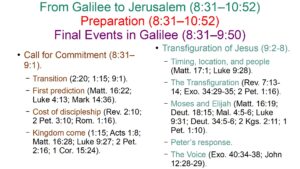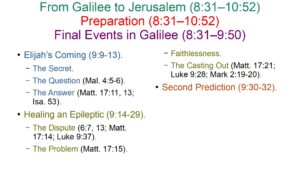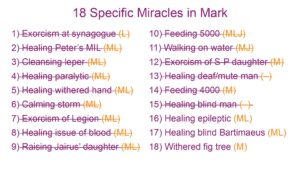Jesus from Galilee to Jerusalem
Mark 8:31–10:52
Preparation
First Prediction of Death and Resurrection (8:31).
The Kingdom is Near (1:15; 9:1)
Final Events in Galilee (8:31–9:50).
Call for Commitment (8:31–9:1).
Transfiguration (9:2-8).
Timing, people, location.
The Transfiguration.
Moses and Elijah.
Have you ever been so nervous that you didn’t know what to say, but too awkward to stay silent? That was Peter in this situation.
He meant well, wanting to honor these two great men of history with tabernacles or tents.
Such a tabernacle or tent implied some kind of sacred dwelling meant to honor these great men on the mountain, and no doubt to commemorate this event.
The problem was Peter wanted to honor Jesus as on the same level as Moses and Elijah.
Again, he had no idea what he was saying; he was afraid. Wouldn’t you be at such an amazing sight?
The Voice.
What preceded the voice was a cloud that came over them—God’s presence is often depicted as a cloud in the OT. When the tabernacle was completed, a “cloud covered the tabernacle of meeting, and the glory of the Lord filled the tabernacle” (Exo. 40:34-38). That cloud continued to guide the Israelites throughout the wilderness.
Peter wanted to build tabernacles for all three, not realizing the true tabernacle is Jesus Christ Himself, guiding us through the wilderness of life.
This shows the second time God’s voice came to affirm Jesus as His Son.
The first was at His baptism, where John the Baptist and those present heard it. Now only this trio hears God’s voice, affirming the very confession they made a week before. The third, recorded only in John 12:28-29, is heard by many others, though many supposed it to be thunder.
Not only this, it stands out as God giving His authority to His Son Jesus, that we should hear Him even over Moses and the Prophets. Jesus now takes precedence over the authority OT Scriptures.
Then Moses and Elijah vanish, leaving only Jesus and our dumbfounded trio.
The message to us is clear—listen to Jesus!
The secret.
Clearly Jesus did not want others to know about the Transfiguration just yet.
It is unclear as to why, however.
Perhaps He feared people wouldn’t believe it at first and it would discredit Peter, James, and John before they would serve as witnesses of His resurrection.
Perhaps He didn’t want His other disciples to feel jealous about not including them.
Perhaps it was because of the snake-in-the-grass Judas Iscariot, and if He singled him out, He would have tipped His hand (or the other disciples would have turned against him).
Perhaps Judas would not have betrayed Jesus had he seen or been aware of this event.
Whatever the reason, a time stamp was given on this secret: until after the resurrection.
We saw in a sermon recently that Peter did, indeed, talk about it later (2 Pet. 1:16-18), and John made allusions to it in his writings (e.g. John 1:14).
They kept the secret, but weren’t sure about the rising from the dead part.
After Jesus just explained to them that this would happen (8:31), they still had questions.
Since they couldn’t reconcile their idea of the Messiah with one who suffers and dies, a resurrection was still unbelievable to them despite the resurrections they had already seen (e.g. Mark 5:41-42).
Or perhaps they were grappling with how a resurrection would fit into all of this—particularly when it came to Elijah’s prophesied coming.
The question.
These three disciples had a burning question in their minds concerning Elijah.
After seeing Elijah up on the mountain with Jesus and Moses, it called to their minds the prophecy that the scribes would reiterate.
This prophecy, as we’ve already discussed at the beginning of our look at Mark and we mentioned more recently, was given by Malachi 4:5-6.
Perhaps they thought this was the fulfillment of that prophecy, but were curious why they had to keep it a secret if it were already foretold—wouldn’t they want people to know about Elijah’s coming?
It’s a logical question given what they knew by this point.
The answer.
Jesus responds with an affirmative answer—yes, Jesus is coming first.
The tenses in these two verses are interesting.
Upon reading it in the NKJV, it sounds like Jesus is saying Elijah had not yet come in 9:12, but in 9:13 He says that he has already come—which is it, Jesus?
Looking at the original language, the tenses are even more interesting.
Vs English (NKJV) TR Greek Tense 9:12 is coming ἐλθών aorist “ restores ἀποκαθιστᾳ present 9:13 has come ἐλήλυθεν perfect “ did ἐποίησαν aorist
Aorist tense is an indefinite tense, but still concerning a past action.
Coupled with the present tense in 9:12 may be why they translated it the way they did, along with a perfect tense in 9:13.
There is an historical present tense, however, that Mark often uses. He uses it to make the events he describes more vivid and lively. We translate it in the past tense. Perhaps this is the sense in 9:12?
But in the parallel account in Matt. 17:11, the word “restore” is in the future tense!
I think the best way to look at it is that Elijah came, began the process of restoring all things, and that work will continue after he has gone.
Jesus throws in their another mention of His suffering and rejection, and that it was prophesied in the OT. One clear passage is Isaiah 53.
Jesus also mentions that it was also prophesied of Elijah’s suffering and death.
Of course, He wasn’t talking about the literal Elijah—Matthew’s account explicitly affirms that He was talking about John the Baptist as the disciples understood (Matt. 17:13).
It is interesting that their minds went straight to John, as if it were obvious from his fiery preaching and his attire—as it should have been.
So where do we see Elijah’s suffering prophesied? Well, we see that he did suffer on this earth, so much so that he despaired his life.
We might recall that people wanted to kill Elijah, especially Jezebel, King Ahab’s wife and queen.
And in Mark 6 we read of the queen (Herodias) wanting to kill John and succeeding.
While not a prophecy in the conventional sense, it is in the typical sense (that is Elijah being a type of John the Baptist).
 Healing an Epileptic (9:14-29).
Healing an Epileptic (9:14-29).The dispute (9:14-18).
It seems that while Jesus and the three disciples (Peter, James, and John) were on the high mountain, a dispute arose between the remaining nine disciples and the scribes.
If the Mount of Transfiguration is Mt. Tabor, this could be anywhere around that mountain. Who knows what villages were there at that time? They might have a better idea.
If it is Mt. Hermon, then it is very likely Caesarea Philippi.
The people are greatly amazed when they see Jesus—some have speculated that Jesus was still glowing after His Transfiguration experience, much like Moses was glowing after coming down Mt. Sinai. Maybe, maybe not.
In any event, based on the information we have, here is what I think happened while they were away …
The father of this demon-possessed boy recognizes the disciples, and knows they have the ability to heal others. Jesus had given them this power (6:7, 13).
Desperate, he begs them to heal his son. They try but are unable to do so.
The scribes notice this and now think they’ve finally got Jesus.
They had been looking for any opportunity to bring Him down, and now, finally, they found something, some shred of imperfection … or so they think.
As a result, they argue with the disciples: “Ha! You think you have the power of God, but you can’t even do this!” “But we have done this many times. We’re not sure why we’re not able to this time.” “Yeah right! Everyone look at these charlatans!” And so on, not caring about the plight of the man and his son.
Then Jesus arrives, asking what’s going on. Some manuscripts say “they” instead of “He” in 9:14, indicating that Jesus, Peter, James, and John came to the other nine. This makes the most sense, since even in the other accounts, it occurs right after the Transfiguration, so the four would be together approaching this dispute. We see this in the parallel accounts, too (Matt. 17:14; Luke 9:37).


